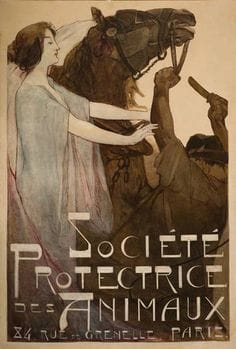
Illustration of Fanny Martin by Brittany Brooks
Being an advocate for animals can be a challenging task. It is very difficult to so be acutely aware of the many ways in which animals are exploited and harmed in our contemporary world because we are surrounded by reminders of just how ubiquitous this cruelty is. Take, for example, a holiday meal with friends and family where a meat dish is the centrepiece–where others may see a tasty treat, an animal welfare/rights/liberation activist may see a visceral reminder of suffering and death. To be constantly faced with these material reminders of the ways in which animals are (mis)treated in our society can certainly take an emotional toll. Recently there have been a number of articles offering tips on how to avoid compassion fatigue, activist burnout and how to combat the depression that often goes hand-in-hand with caring deeply for those who are suffering.
As I read these articles I can not help but think of Marie-Françoise (“Fanny”) Bernard (née Martin) who was married to Claude Bernard, a 19th century French physiologist best known for his experiments on animals. Claude Bernard was often the focus of public anti-vivisection campaigns conducted by people like Frances Power Cobbe, but this tension also played out within his domestic life. Fanny Martin detested her husband’s experiments on animals, many of which he conducted at home. To add insult to injury, the dowry paid by her father at the time of the marriage in 1845 helped to fund many of Bernard’s experiments on animals.
Perhaps as a way to attempt to make amends for her husband’s treatment of animals in his laboratory, Fanny Martin and her two daughters established a “rescue home” for stray dogs and cats. They also attended anti-vivisection protests and volunteered with the Société protectrice des animaux. Finally, in 1870 the couple legally separated, no easy task for Catholics in 19th century France!

* Deborah Rudacille, The Scalpel and the Butterfly: The War Between Animal Research and Animal Protection (New York: Farrar, Straus and Giroux, 2000): 19.
Fanny Martin’s empathy for animals must have made her life with Bernard nearly unbearable. I marvel at the courage it must have taken for a woman in the 19th century to stand up to her husband and to take their children to protests that directly opposed their father’s work. Her volunteer work and the efforts she put in to setting up an institution to care for neglected, stray, sick, and lost dogs and cats (many of whom would otherwise end up in vivisection laboratories) is an almost forgotten footnote in the history of animal advocacy. Indeed, very little has been written about Martin and what does exist is mostly gleaned from biographies of her famous husband, biographies that, as one writer noted, “dismiss her as an uneducated woman who made Bernard’s home life hell and deprived him of the company of his daughters.”*
I propose we change this dialogue and remember Fanny Martin for her courage, bravery, and her uncompromising empathy for animals. May she serve as an inspiration for those continuing to stand up against cruelty to animals.
